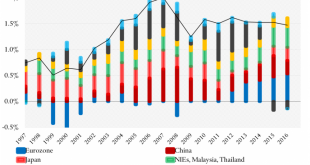Otmar Issing can look back on a long and consequential central banking career. Even in his retirement he is still living the part, evaluating whether his successors at the European Central Bank are pursuing stability-oriented monetary policies to his liking. His most recent critique (“‘Living in a fantasy’: euro’s founding father rebukes ECB over inflation response” https://www.ft.com/content/145b6795-2d21-48c6-984b-4b05d121ba16) shows him on the wrong side of events and debates about...
Read More »Otmar Issing Is Still Living in His Monetary Fantasy World
Otmar Issing can look back on a long and consequential central banking career. Even in his retirement he is still living the part, evaluating whether his successors at the European Central Bank are pursuing stability-oriented monetary policies to his liking. His most recent critique (“‘Living in a fantasy’: euro’s founding father rebukes ECB over inflation response” https://www.ft.com/content/145b6795-2d21-48c6-984b-4b05d121ba16) shows him on the wrong side of events and debates about...
Read More »IMF Provides Cover for Europe’s Dysfunctional Currency Union
The Council on Foreign Relations’ Brad W. Setser has produced a couple of interesting blogposts on Germany’s fiscal policies of late. The first one, titled “Germany Cannot Quit Fiscal Consolidation,” was published at the end of August. On September 18th, the second one appeared, titled “The Global Cost of the Eurozone’s 2012 Fiscal Coordination Failure.” The latter is more limited in scope and draws heavily on a recent report by the Banque de France. Setser elaborates on the rather...
Read More »The “German Problem” Is Not a Problem for Anyone to Worry About. Or Is It?
It took a very long time. Too long. But just in time for the recent G20 meeting in Hamburg on July 7-8, The Economist’s cover page story featured Germany’s persistent current account surpluses as the world community’ new “German problem”; supposedly an issue of foremost interest to the G20. In fact, Germany has run up current account surpluses exceeding 4 percent of GDP in each and every year since 2004. For the last couple of years Germany’s surpluses even exceeded 8 percent of GDP....
Read More »Why Macron Should Not (and Cannot) Follow the German Model
Jörg Bibow | June 2, 2017 The Economist‘s analysis of Germany’s job market miracle of the past ten years offered in “What the German economic model can teach Emmanuel Macron” is more balanced than the usual accounts one hears in Germany itself. Germans are in love with the idea that structural reform of their labor market and persistent budgetary austerity were solely responsible for the German economy’s superior performance...
Read More » Heterodox
Heterodox

